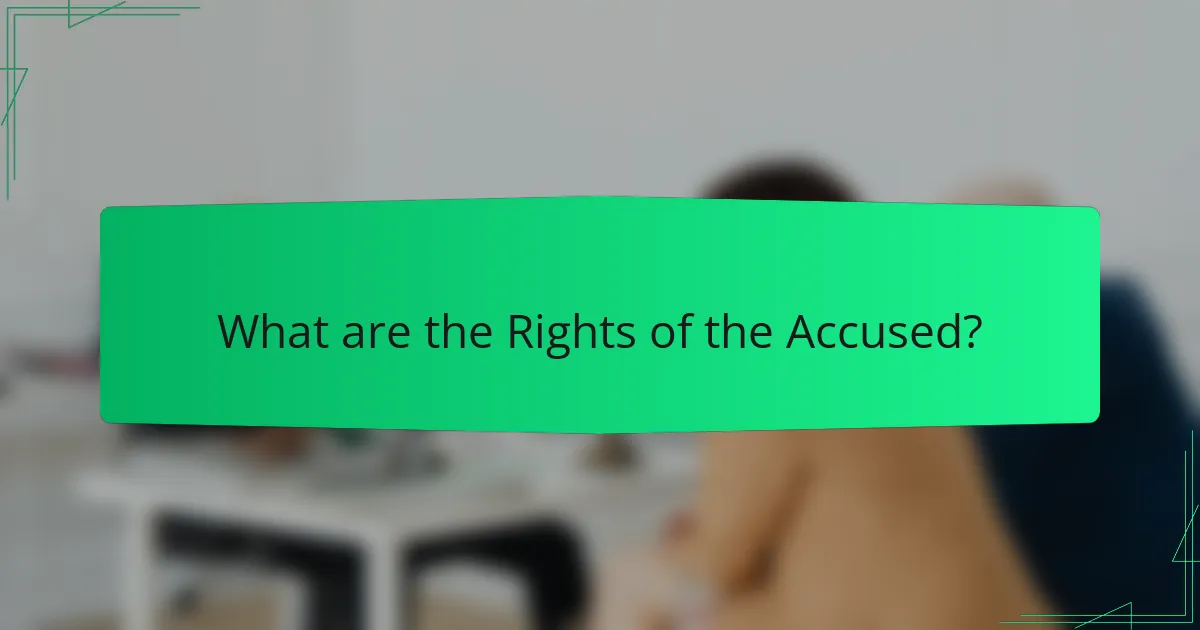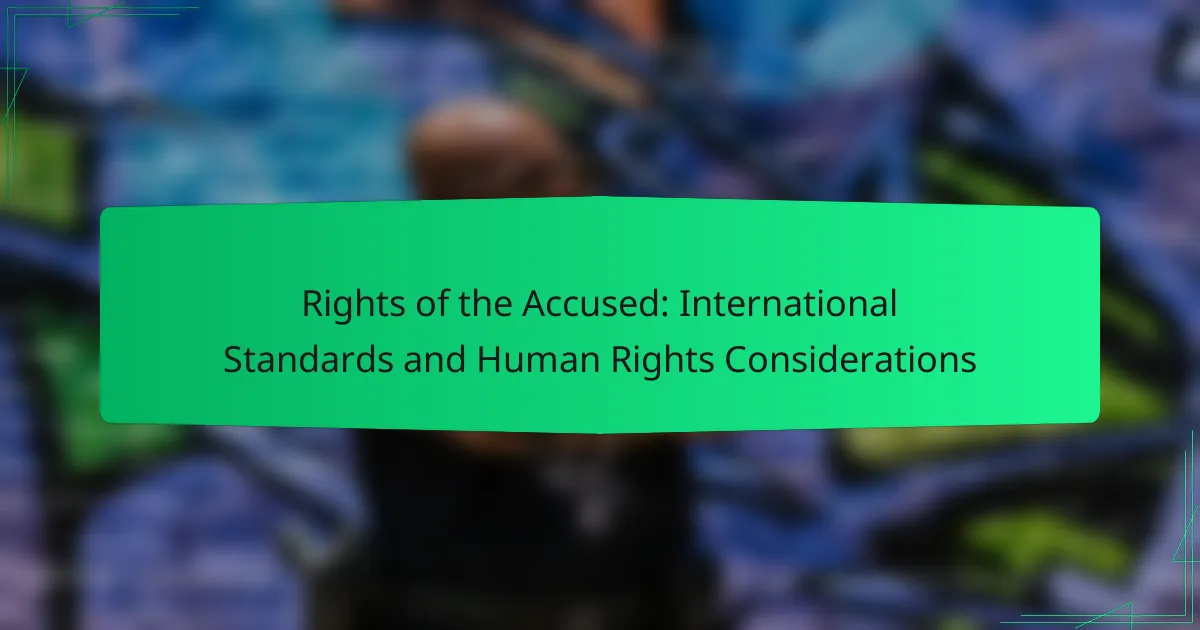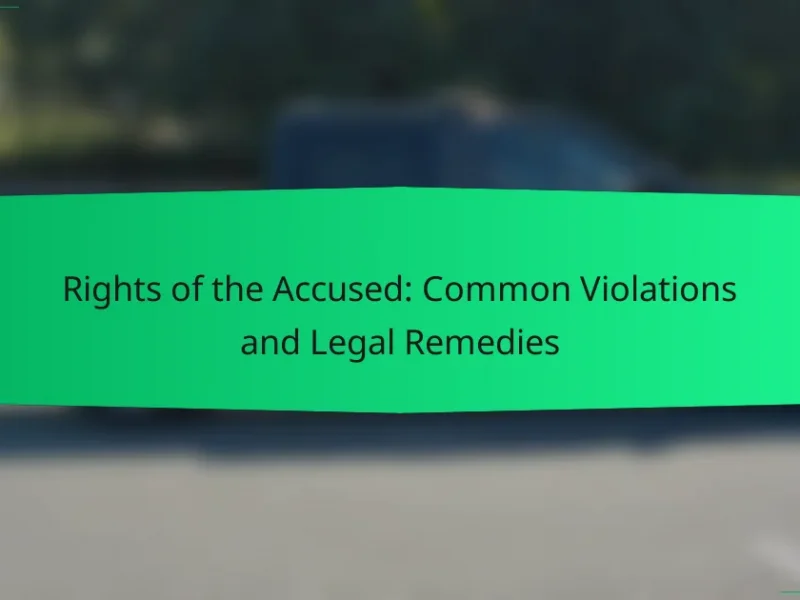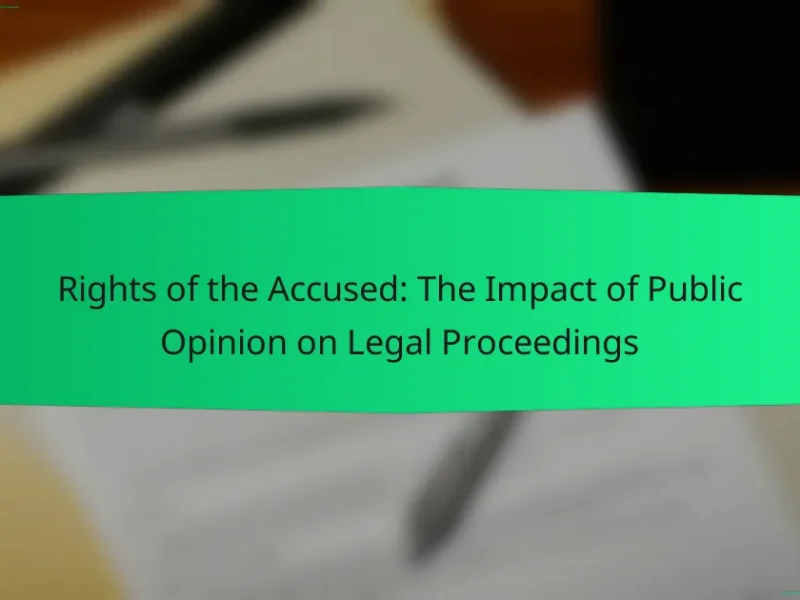The rights of the accused are fundamental legal protections that include the presumption of innocence, the right to a fair trial, and the right to legal representation. These rights ensure that individuals are treated justly within the legal system, as outlined by international human rights documents such as the Universal Declaration of Human Rights and the International Covenant on Civil and Political Rights. Key principles include the requirement for an impartial hearing and the provision of qualified legal counsel. However, challenges such as systemic biases, inadequate legal representation, and public opinion pressures can undermine these rights, complicating their enforcement across different jurisdictions. This article examines these rights and the associated challenges, highlighting their significance in upholding justice.

What are the Rights of the Accused?
The rights of the accused include the presumption of innocence, the right to a fair trial, and the right to legal representation. These rights ensure that individuals are treated justly within the legal system. The presumption of innocence means that the accused is considered innocent until proven guilty. A fair trial guarantees impartiality and the opportunity to present a defense. Legal representation ensures that the accused has access to professional legal advice. According to the Universal Declaration of Human Rights, everyone has the right to a fair and public hearing. Additionally, the International Covenant on Civil and Political Rights emphasizes these rights as fundamental to justice.
How do international standards define the rights of the accused?
International standards define the rights of the accused through various legal frameworks and treaties. These include the Universal Declaration of Human Rights and the International Covenant on Civil and Political Rights. Key rights include the presumption of innocence, the right to a fair trial, and the right to legal counsel. The accused must be informed of the charges against them promptly. They have the right to present a defense and to challenge evidence. Additionally, international standards emphasize protection against torture and inhumane treatment. These rights aim to ensure justice and uphold human dignity in legal proceedings.
What are the key legal documents that outline these rights?
The key legal documents that outline the rights of the accused include the Universal Declaration of Human Rights (UDHR) and the International Covenant on Civil and Political Rights (ICCPR). The UDHR, adopted in 1948, establishes fundamental human rights applicable to all individuals. Article 11 specifically addresses the presumption of innocence until proven guilty. The ICCPR, which came into force in 1976, further elaborates on these rights. Article 14 guarantees the right to a fair trial and legal assistance. Additionally, regional documents like the European Convention on Human Rights (ECHR) also play a crucial role. Article 6 of the ECHR ensures the right to a fair hearing. These documents collectively form the international legal framework for protecting the rights of the accused.
How do different countries interpret these rights?
Different countries interpret the rights of the accused based on their legal systems and cultural contexts. For example, the United States emphasizes the presumption of innocence and the right to a fair trial, as outlined in the Sixth Amendment. In contrast, countries like Japan may prioritize societal harmony, which can lead to longer detention periods before trial.
European countries often adhere to the European Convention on Human Rights, which mandates fair trial rights and legal representation. In some countries, such as China, the rights of the accused may be limited by state interests, affecting the transparency of legal proceedings.
These variations illustrate that interpretations of accused rights are influenced by national laws, historical precedents, and cultural values.
Why are the rights of the accused important in a legal system?
The rights of the accused are crucial in a legal system to ensure fairness and justice. These rights protect individuals from wrongful conviction and abuse of power by the state. They uphold the principle that a person is innocent until proven guilty. This principle is foundational in democratic societies. The United Nations’ Universal Declaration of Human Rights emphasizes the right to a fair trial. Studies show that legal systems that uphold these rights have lower rates of wrongful convictions. Protecting the rights of the accused fosters public trust in the legal system. It also promotes accountability among law enforcement and judicial authorities.
What impact do these rights have on the fairness of trials?
The rights of the accused significantly enhance the fairness of trials. These rights ensure that defendants receive due process and are treated justly within the legal system. Key rights include the right to legal representation, the right to a fair hearing, and the presumption of innocence. These principles help to prevent wrongful convictions and ensure that all evidence is fairly presented and considered. For instance, the right to legal counsel allows defendants to adequately prepare their defense. Additionally, the presumption of innocence requires that the prosecution prove guilt beyond a reasonable doubt. Research shows that adherence to these rights correlates with lower rates of wrongful convictions and higher public confidence in the judicial system. Thus, these rights are essential for maintaining the integrity and fairness of trials.
How do these rights protect individuals from abuse?
These rights protect individuals from abuse by ensuring fair treatment and due process. They establish legal frameworks that prevent arbitrary detention and mistreatment. For example, the right to legal representation allows accused individuals to defend themselves effectively. The right to a fair trial ensures impartiality and transparency in legal proceedings. Additionally, protections against torture and inhumane treatment safeguard personal dignity. International human rights treaties, such as the International Covenant on Civil and Political Rights, reinforce these protections. These standards hold states accountable for violations, thereby deterring abuse. Overall, these rights create a system that prioritizes justice and individual safety.

What are the core principles of the rights of the accused?
The core principles of the rights of the accused include the presumption of innocence, the right to a fair trial, and the right to legal representation. The presumption of innocence means that an accused person is considered innocent until proven guilty. This principle is fundamental in ensuring that the burden of proof lies with the prosecution. The right to a fair trial guarantees that the accused receives an impartial hearing by a competent tribunal. This includes the right to be heard in a reasonable time frame and to present a defense. The right to legal representation ensures that the accused can obtain assistance from a qualified attorney. These principles are enshrined in international human rights documents, such as the Universal Declaration of Human Rights and the International Covenant on Civil and Political Rights.
How does the presumption of innocence apply to the accused?
The presumption of innocence ensures that an accused person is considered innocent until proven guilty. This principle is a fundamental human right recognized in international law, particularly in Article 11 of the Universal Declaration of Human Rights. It obligates the prosecution to prove the accused’s guilt beyond a reasonable doubt. The accused must not bear the burden of proving their innocence. This principle protects individuals from wrongful conviction and upholds fair trial standards. It is integral to maintaining justice and public confidence in the legal system. The presumption of innocence is a safeguard against arbitrary punishment and discrimination. It reinforces the idea that legal proceedings should be impartial and based on evidence.
What are the implications of the presumption of innocence?
The presumption of innocence implies that an individual is considered innocent until proven guilty in a court of law. This legal principle protects the rights of the accused during legal proceedings. It ensures that the burden of proof lies with the prosecution, not the defendant. This principle is foundational in many legal systems worldwide, including those influenced by the Universal Declaration of Human Rights. The presumption of innocence helps prevent wrongful convictions and upholds the integrity of the judicial process. In practice, it mandates that individuals cannot be punished without a fair trial. It also promotes a fair and impartial examination of evidence. Overall, this principle is crucial for safeguarding human rights and maintaining public confidence in the justice system.
How is the burden of proof determined in legal proceedings?
The burden of proof in legal proceedings is determined by the legal standard applicable to the case. In criminal cases, the prosecution typically bears the burden to prove the defendant’s guilt beyond a reasonable doubt. This high standard is essential to protect the rights of the accused. In civil cases, the burden of proof usually lies with the plaintiff, who must establish their case by a preponderance of the evidence. This means that the evidence must show that it is more likely than not that the claim is true. The specific allocation of the burden of proof can vary based on jurisdiction and the nature of the case. Legal precedents and statutory laws guide these determinations, ensuring fairness in the judicial process.
What role does legal representation play for the accused?
Legal representation plays a crucial role for the accused in ensuring fair trial rights. It provides the accused with guidance on legal processes and procedures. An attorney helps to navigate complex legal systems. They advocate on behalf of the accused during hearings and trials. Legal representation also aids in the preparation of a defense strategy. It ensures that the accused’s rights are protected throughout the legal proceedings. Studies show that defendants with legal representation have better outcomes in court. According to the American Bar Association, legal counsel is essential for upholding justice and fairness in the legal system.
How does access to legal counsel affect trial outcomes?
Access to legal counsel significantly improves trial outcomes for defendants. Legal representation ensures that defendants understand their rights and the legal process. Studies show that defendants with counsel are more likely to receive favorable verdicts. For example, a study by the National Center for State Courts found that represented defendants had a 20% higher chance of acquittal. Counsel also plays a crucial role in negotiating plea deals. Defendants without legal representation may accept unfavorable terms due to lack of understanding. Additionally, legal counsel can effectively challenge evidence and procedural errors. This advocacy leads to fairer trials and better adherence to legal standards. Overall, access to legal counsel is essential for equitable trial outcomes.
What are the rights of defendants to self-representation?
Defendants have the right to self-representation in criminal cases. This right is recognized under the Sixth Amendment of the United States Constitution. The Supreme Court has upheld this right in cases such as Faretta v. California (1975). Defendants must knowingly and intelligently waive their right to counsel. Courts may appoint standby counsel to assist if needed. Self-representation is not absolute; judges can deny it if a defendant is disruptive or lacks legal knowledge. This right is also acknowledged in international human rights standards, affirming the importance of personal autonomy in legal proceedings.

What challenges exist in upholding the rights of the accused?
Challenges in upholding the rights of the accused include systemic biases, inadequate legal representation, and public opinion pressures. Systemic biases can lead to unfair treatment based on race or socioeconomic status. Inadequate legal representation often results from a lack of resources for public defenders. Public opinion can influence judicial outcomes, leading to prejudgment of cases. Additionally, laws may vary significantly across jurisdictions, complicating the enforcement of rights. These challenges undermine the principle of fair trial rights, as outlined in international human rights standards.
How do cultural and political factors influence these rights?
Cultural and political factors significantly influence the rights of the accused. Cultural norms shape societal attitudes towards justice and punishment. In some cultures, collective values may prioritize community safety over individual rights. Political ideologies can dictate the legal framework governing these rights. Authoritarian regimes often limit rights to suppress dissent. Democratic societies typically uphold stronger protections for the accused. Historical context also plays a role; countries with a history of human rights abuses may have weaker protections. The Universal Declaration of Human Rights outlines fundamental rights, but implementation varies globally. These variations reflect the interplay of culture and politics in shaping legal standards.
What are some examples of violations of the rights of the accused?
Examples of violations of the rights of the accused include unlawful detention and denial of legal representation. Unlawful detention occurs when individuals are held without proper legal justification or due process. Denial of legal representation undermines the right to a fair trial, as guaranteed by international human rights standards. Other violations include coerced confessions obtained through torture or inhumane treatment. Such practices violate the principle of presumption of innocence, which is fundamental in criminal justice. Additionally, lack of access to evidence against the accused can impede their ability to mount a defense. These examples highlight significant breaches of the rights of individuals within the legal system.
How can public opinion affect the enforcement of these rights?
Public opinion can significantly influence the enforcement of the rights of the accused. When the public expresses strong support for these rights, it can lead to increased political pressure on lawmakers. This pressure may result in the strengthening of legal protections for accused individuals. Conversely, negative public sentiment can lead to the erosion of these rights. Historical examples show that public outcry can prompt reforms in criminal justice systems. For instance, movements advocating for due process have led to legislative changes in various countries. Therefore, public opinion serves as a crucial factor in shaping the enforcement of rights for the accused.
What measures can be taken to strengthen the rights of the accused?
Implementing legal reforms can strengthen the rights of the accused. These reforms include ensuring access to legal representation at all stages of the criminal process. Providing adequate funding for public defenders is essential for fair representation. Establishing clear guidelines for the treatment of detainees can prevent abuse and ensure humane conditions.
Training law enforcement on the rights of the accused can enhance compliance with legal standards. Promoting transparency in the judicial process helps build trust in the system. Additionally, creating independent oversight bodies can address complaints against law enforcement and judicial misconduct.
These measures align with international human rights standards, such as the Universal Declaration of Human Rights, which emphasizes the right to a fair trial and legal assistance. Implementing these reforms can lead to a more equitable justice system.
How can legal reforms improve the protection of these rights?
Legal reforms can enhance the protection of the rights of the accused by establishing clearer legal frameworks. These reforms can ensure that due process is upheld consistently. They can also introduce stricter guidelines for law enforcement practices. This includes regulations on interrogation techniques and the treatment of detainees. Furthermore, legal reforms can mandate regular training for legal professionals on human rights standards. This training can improve awareness and compliance with international norms. Additionally, reforms may implement independent oversight bodies to monitor law enforcement and judicial practices. Such measures can increase accountability and transparency in the justice system. Ultimately, these changes can lead to a more equitable legal environment for accused individuals.
What role do international organizations play in promoting these rights?
International organizations play a crucial role in promoting the rights of the accused. They establish international standards that member states are encouraged to adopt. Organizations like the United Nations and the International Criminal Court monitor compliance with these standards. They provide technical assistance and training to improve national legal systems. Furthermore, they advocate for the rights of individuals through reports and public campaigns. These organizations also facilitate dialogue among countries to address human rights violations. Their efforts contribute to the development of legal frameworks that protect the accused globally. The Universal Declaration of Human Rights is an example of a foundational document influenced by these organizations.
What best practices can be implemented to ensure fair trials?
Best practices to ensure fair trials include providing legal representation to all defendants. Access to a qualified attorney is essential for effective defense. Courts should ensure impartial judges to maintain fairness in proceedings. Transparency in the judicial process builds public trust and accountability. Timely access to evidence is crucial for proper defense preparation. Jury selection must be unbiased to reflect a fair cross-section of the community. The presumption of innocence should be upheld throughout the trial. Adherence to established legal standards and procedures protects the rights of the accused. These practices are supported by international human rights guidelines, such as the International Covenant on Civil and Political Rights.
The primary entity of this article is the “Rights of the Accused,” which encompasses fundamental legal protections designed to ensure fair treatment within the justice system. The article outlines key rights such as the presumption of innocence, the right to a fair trial, and legal representation, emphasizing their significance in upholding justice and preventing wrongful convictions. It also examines international standards, including the Universal Declaration of Human Rights and the International Covenant on Civil and Political Rights, that define these rights. Additionally, the article discusses the impact of cultural and political factors on the interpretation and enforcement of these rights, as well as challenges and best practices for strengthening them globally.


